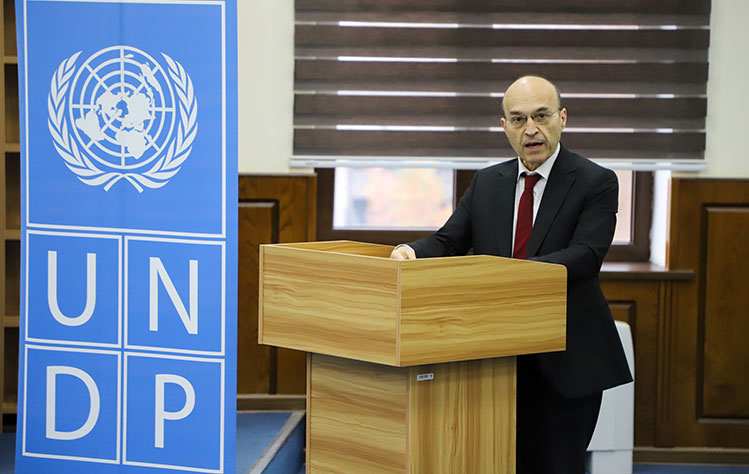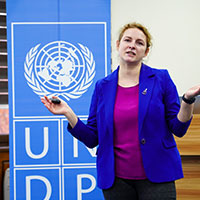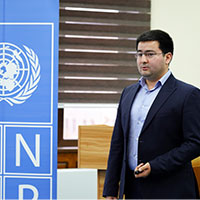Webster Tashkent Welcomes Officials from United Nations, Uzbekistan Ministry to Discuss Country’s Accession to WTO
December 09, 2022

Webster Tashkent Rector Vassilis Polimenis welcomed officials from the United Nations and Uzbekistan’s Ministry of Investments and Foreign Trade to the University’s campus in Tashkent, Uzbekistan on Nov. 29 as part of a guest lecture series for students and the larger community.
 Volha Rakhanskaya, international consultant at the United Nations Development Programme;
Nosirkhon Gozikhonov, World Trade Organization (WTO) coordinator for the United Nations
Development Programme; and Alijon Aliev, chief specialist at the Ministry of Investments
and Foreign Trade for the Republic of Uzbekistan, visited the University to discuss
the role of a multilateral trading system in a contemporary world as well as the process
of Uzbekistan’s accession to the World Trade Organization.
Volha Rakhanskaya, international consultant at the United Nations Development Programme;
Nosirkhon Gozikhonov, World Trade Organization (WTO) coordinator for the United Nations
Development Programme; and Alijon Aliev, chief specialist at the Ministry of Investments
and Foreign Trade for the Republic of Uzbekistan, visited the University to discuss
the role of a multilateral trading system in a contemporary world as well as the process
of Uzbekistan’s accession to the World Trade Organization.
The presentation, geared specifically toward Webster students majoring in International Relations, gave the audience a chance to learn about the history of the General Agreement on Tariffs and Trade (GATT) and the WTO, what the organization does, the key principles that WTO member states follow, and what steps Uzbekistan is taking to be part of it.
 The expert panel shed some light on dispute settlements, transparency mechanisms,
international negotiations and international supply chain-related issues.
The expert panel shed some light on dispute settlements, transparency mechanisms,
international negotiations and international supply chain-related issues.
Rakhanskaya outlined that members wanting to join the WTO must go through an accession process involving negotiations between the applicant and WTO members. She provided an overview of that process, which aims to ensure that an acceding government’s legislation and practices will be compliant with the WTO rules, and that it will become a full and effective player from its first day of membership. Rakhanskaya illustrated that Uzbekistan is in the multilateral, plurilateral and bilateral negotiation phases.
Aliev emphasized the benefits of WTO membership including:
- Highly favored international treatment, which means equal access for all companies of all WTO members to the markets of other WTO members.
- National treatment that prohibits national producers from gaining advantages over importers.
- Reduction of trade barriers, primarily tariffs and quantitative restrictions, which provides for increased trade between members.
- Predictability and transparency of international trade.
- Bound tariffs, meaning WTO members cannot, except for good reason, introduce other import restrictions, such as bans or quotas.
- Increased competitiveness through the elimination of unfair practices between trading partners aimed at stimulating trade, including export subsidies and dumping.
- The opportunity to defend trade interests at the WTO Dispute Settlement Body since all members will have international commitments toward Uzbekistan for non-application of trade restrictions.
The panel concluded by participating in an audience question-and-answer session and sharing some expert advice for students who are seeking career opportunities with international organizations.
Established in 2019 through the decree of the president of the Republic of Uzbekistan, Webster University Tashkent is an official campus of Webster University in St. Louis, Missouri. As the premier American university in Central Asia, Webster Tashkent is committed to ensuring high-quality learning that transforms students for global citizenship and individual excellence.
